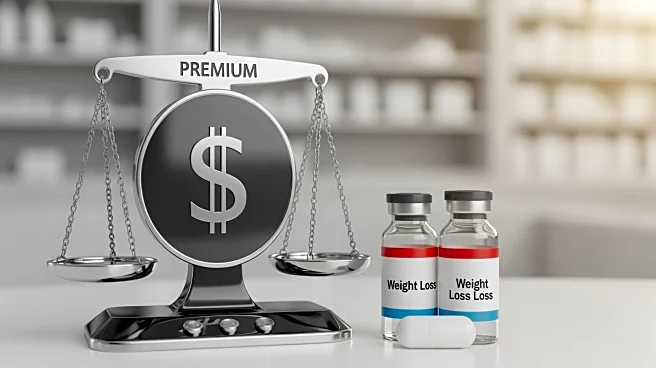What's Happening?
President Trump has successfully negotiated agreements with pharmaceutical companies Eli Lilly and Novo Nordisk to reduce the prices of their popular weight loss drugs. These deals aim to make the drugs more
affordable for patients, with monthly costs ranging from $50 to $350 depending on dosage and insurance coverage. Currently, the list prices for these GLP-1 drugs, such as Eli Lilly's Zepbound and Novo Nordisk's Wegovy, exceed $1,000 per month, limiting accessibility for many patients. The agreements are part of Trump's 'most favored nation' policy, which seeks to expand access to these medications. Additionally, Medicare will begin covering these drugs for obesity starting mid-2026, potentially increasing coverage by private insurers as well.
Why It's Important?
The reduction in drug prices is significant as it addresses the high cost barrier that has prevented many patients from accessing effective weight loss treatments. By making these drugs more affordable, the agreements could lead to broader use among patients who need them for obesity and related health conditions. This move is expected to benefit seniors, as Medicare will cover these drugs for obesity, potentially improving health outcomes for this demographic. The deals also set a precedent for pharmaceutical pricing negotiations, potentially influencing future agreements and policies aimed at reducing healthcare costs.
What's Next?
With the agreements in place, Eli Lilly and Novo Nordisk are expected to receive fast-track reviews for their upcoming obesity pills. The Trump administration plans to launch TrumpRx, a direct-to-consumer platform for purchasing prescription drugs, which will offer these weight loss drugs at discounted prices. As the new pricing structures are implemented, stakeholders including patients, healthcare providers, and insurers will likely monitor the impact on drug accessibility and health outcomes. The pharmaceutical companies may also adjust their strategies to align with the new pricing models and expand their market reach.
Beyond the Headlines
The deals could have broader implications for the pharmaceutical industry, potentially encouraging other companies to negotiate similar agreements to reduce drug prices. This could lead to increased competition and innovation in the development of affordable treatments for chronic conditions like obesity. Additionally, the focus on reducing healthcare costs aligns with ongoing debates about drug pricing transparency and the role of government in regulating pharmaceutical markets.










